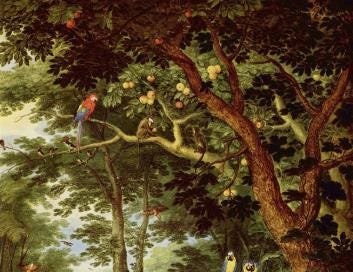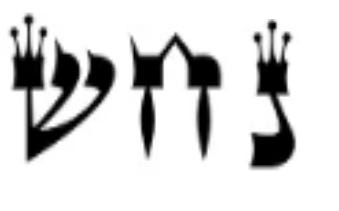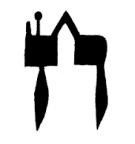Genesis’ Second Creation
Gasping for air, he woke up. Adam the second was lying in a fresh meadow with the sun shining in his eyes and some pleasant paradise perfumes piercing his nostrils. He rolled over, to close his eyes once more to keep on dreaming. However, a little purple bird with bright orange dots jumped around him, chirping loudly as if to say that the world required his attention. God had been there before. Though there had been a first creation, God realised that something was missing – though it had already been good in so many ways. Having withdrawn from creation, God decided to make space for man the second time. The first manspace was born. Soon, God had realised that to make a point to humankind, creation had to be redone. This time, not just infusing the world with harsh, dry laws or of physics, science, and justice. Next, there would be space for arts, feelings, and compassion too. To show that these were essential too.
Adam stood up, finding himself, all alone in the herbs of the field. Something was missing but he was not quite sure what. Dazed, he looked around. Surely, it was different the last time he was created. He felt lonely. Bereft. God saw that his creation was not going to survive on its own. So, divine intervention was needed. Quickly. Let’s get Adam to fall asleep again. I will fashion him a partner from his side. Let’s see what comes of him then.
Creation of Mercy
On the surface, the second chapter of Genesis simply tells the story of creation all over again. This second time, the story of creation is a focused version of man and the context he lives in. What is required for him to be comfortable in his habitat? There are many textual elements that allude to distinct differences in the two instances of creation. One important difference that jumps out is that in the Hebrew names of God used in the second chapter are they different from the ones used in the first chapter. The second chapter uses the equivalents of both “Lord” and “God,” whereas only “God/(Elokim)” is used in the first chapter. The English translated “Lord” always indicates God in his merciful version as opposed to “God” who is a harsh judge. This added element of mercy in the second creation story is reflected throughout this later chapter.
Why does God start from scratch? Was the world not working out? Could he not see this coming? In Jewish exegesis and Kabbalah, the world is built on mercy the second time around. The second chapter repeats the creation of the world. This time it is focused around man and all that is created around him. Humanity needs its environment and vice versa. Man needs humanity. Someone to be with. Society. Harsh (scientific) laws are not enough.
A Talmudic scholar, “Rav,” remarks on the beginning chapters: The Lord God can be compared to a king who had some glasses to fill with water. “If I pour hot water into them, they will burst; If I put cold water in them, they will snap. In the end he mixed hot and cold water, so they remained unbroken.
It was as if God was tinkering with the universe in trial and error. Or was God trying to make a point? It is no coincidence that the second chapter deals with the tree of the knowledge of good and evil. In a world of good and evil, you need justice and mercy. The state of nature is too frightening for man. Political philosophers try to find solutions to exactly that problem: should they be ruled by a harsh ruler or a benevolent government?
Eve – Ignorance is bliss
Back in the garden of Eden, Eve, just forged from Adam’s side, blissfully wandered around the garden of Eden. The trees blossomed and fireflies filled the fiery evening sky. What was she thinking about? Adam, walking alongside Eve, was staring in the distance, admiring the world’s beauty. Happy that he now had someone to keep him company. “By the way,” Adam said, “Do you see that bird right there? I called it the “Greater Bird of Paradise,” pointing at a bird with elaborate plumage making odd noises. Eve observed it intently. “Besides” Adam continued “you should know that God told me we can eat everything here apart from that tree over there pointing at a large tree standing orphaned on a distant hilltop. It is apparently called the “Tree of Knowledge”. Eve looked at it in awe wide-eyed, not knowing its significance – yet…
As Adam wandered off, Eve slowly approached the tree. A small snake spiralled down its bark. Curiously observing what it had found, the snake looked more closely at Eve. Its tiny eyes quickly rotating back and forth, as if to check whether it was alone. Slyly welcoming the new arrival, it hissed: “Isss it true that you cannot eat from every tree of the garden?”
Unaware of how dangerous the snake was, Eve approached the animal, its strange appearance intriguing her. Observing it from up close, she said: “Why should I care about this tree?” More interested in the unusual shape of the animal she continued: “Why is your tongue split? Adam told me he named your family “NaChaSh,” I wonder why… After briefly considering it, she continued: “Are you trying to pry us apart like your name Nun Het Shin suggests?” The snake, not quite certain what she meant, spiralled down to Eve’s feet: “Why would what be?” the snake asked Eve, touching her chin while thinking put her hand on the tree “Well the first letter Nun is one peg; the second letter Chet is two pegs and Shin has three pegs. It seems like you are progressively splitting apart.”
With its reptilian brain overloaded, the snake’s eyes were spiralling out of control. Shaking its head snakily sidestepping her question and backtracking the conversation: “No, no, I am just saying that you have sssome wonderful soulmate. Why would he try to hold things from you?” Eve looked around for Adam, as the snake made its way down the tree even further. Nearly reaching the ground, it continued: “Let me explain something to you. You have been told nothing. You may live in the world of ignorance above here but there is another world down “below”. He observed Eve’s surprise. “Outside this beautiful garden, there is pain and suffering. You can choose to stay here and ignore it, or you can sssuck up this painful knowledge that requires you to empathise and experience it fully.” Eve still did not really get it. The snake curled up next to her - elevating its head and sticking its tongue out towards her:
“But why not eat from the tree? Yes, it may hurt and expose you and your children to suffering and death like you were told, but at least you would have lived. You will be elevated to be a godlike creature, knowing the difference between good and evil, truth and lies.”
“Being a “‘godlike creature’?” Eve repeated the snake. Though all was perfect, she was curious about what all this meant. The world outside the Garden of Eden did not sound appealing. Unaware of what she was doing, she reached for the fruit and took a quick bite. The taste was wonderfully potent and its texture vivid, crunchy. Look, it even had her reflection on it! This was quite a lot better than the other fruits she had enjoyed! Why were the others so bad? As she was about to take another bite, Adam tickled her spine. She nearly dropped the fruit as she realised what she had done. “Where have you been?” she said, thinking, “Ooh nice physique…” Carelessly, her hand unwrapped itself, the fruit rolling out of her hand into Adam’s. She started to feel like she was being watched. Adam took a bite himself. Opening his eyes wider, he suddenly admired Eve’s eyes. Looking at each other with intensity they understood the wonder that they were observing their nakedness. Adam said: “Well at least I now see you for who you are and what is missing here. I am glad to have had this epiphany.”
Eve and Adam ate the forbidden fruit. When God came to ask the hiding couple where they were and what they had done, they were too scared and embarrassed at first. They were hiding away from their newfound nakedness. Adam pointed at his wife, She, in turn, pointed at the deceiving, hissing snake in the shrubs. Finally, to be banished from the Garden of Eden – to toil hard, suffer at childbirth, forever.
Creation of Knowledge
Sin and Het
The story of the original sin – or “Het” in Hebrew – carries a story and is not as straightforward as it seems. The word is identical to the eighth letter of the Hebrew alphabet, the letter Het. The word “Het” or “חטא,”, is normally translated as “sin” but also as “movement from its right place”. The interpretation of the story has a dual nature. Besides the punishment of original sin, there is a purposeful eviction from the place of Eden. In some interpretations, this is foretold by the start of the second chapter. The start notes that the earth is barren and requires someone to work it. This predicts an intention to evict/move Adam and Eve from Eden in the first place. So, is the sin not all as bad as it may seem?
There are many other lessons one can draw from the story of creation. To some extent, it is a choice to see all as bad or not. The simple meaning of a story is often viewed as superior due to its closer proximity to the truth. However, you could view the story of the forbidden fruit both as a sin and as a conscious step by Eve and Adam to save mankind. In effect it was that which bonded the first couple, making them conscious, taking on pain to save the imperfect world together.
This connected couple is signified in the letter Het itself. Sometimes the letter is professed to signify the connection between a man and a woman. This first man and woman symbolise the entire world, connected in a higher realm or paradise and split in the broken, real world. Seeing the world’s differences is fine, if you understand the connected essence, the end goal.
Het and the subsequent divisions from the story, are connected through the key persona that caused this split itself. The snake’s “NaChaSh” - middle letter is the Het itself - seemingly the snake’s persona, envelops its very purpose in life to cause sin. The snake tells Eve and us, that acquiring the knowledge of good and evil will make us “godlike”. So too, fully understanding what is important to us, is perhaps what leaves the world in its current state.
Whether you view the Bible as divine, divinely inspired, or man-made, it is a worthwhile context to understand dichotomies. By virtue of so many people having had the Bible as a source of inspiration throughout the ages, the dichotomies of the stories of Genesis permeate throughout philosophy, science, and the arts and therefore society.
Like Adam and Eve’s experience, acquiring knowledge can initially be a painful process. Subsequently, gaining knowledge can require hard work and demand a lot to execute and implement change. Knowledge has often been suppressed for gain of power. However, acquiring knowledge can maybe contain an element of direct downside: It contains a lack of humility; that we can be godlike. It further contains a dissatisfaction with the world as it is. However, once knowledge is attained, there is a positive element to it: we must lower ourselves to another world and be humble to some extent. After all, the more you know, the more that you realise you know very little.
Practically, the Persian “Paradise” or “walled garden” is used in the Hebrew Pardes. To gain knowledge, requires us to step outside our walls and enter a new domain, to view elements beyond our own scope. It means you must leave your walled garden: knowing your limits and your own biases.
To mend a broken world, is key for us to regain a paradise lost. Laws are needed, but mercy and knowledge are needed too. In that sense, it is telling that the story of the original sin ends with God showing mercy. Namely, though death was promised when eating from the tree of knowledge, man wasn’t killed that very day. Was there an element of acceptance of the choice (whether Adam was unaware or not)? Were we forgiven or, perhaps, was it the right choice in the first place?
Opening our eyes, gaining knowledge, and stepping outside our own perimeter, seeing what’s outside our paradise may be perceived as wrong. Perhaps we can look at it differently. Eating the forbidden fruit will have been worth eating and benefit others in the process. Simplification is not always bad. Being aware of simplification neither. Different elements contribute to simplification. Figuring out to some extent what some of the causes and effects of simplification are; gives us some ability to discern between good and bad, truth and lies – that is the aim of this book.





